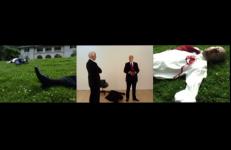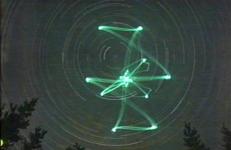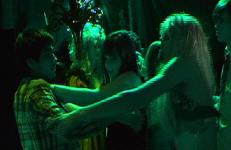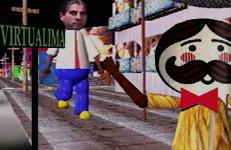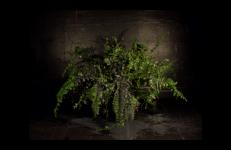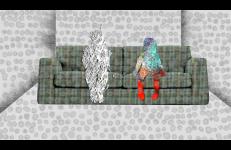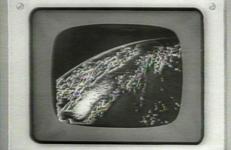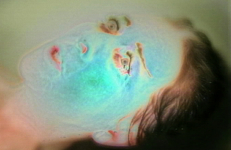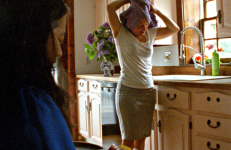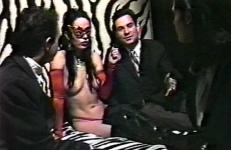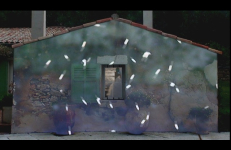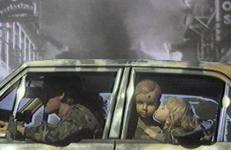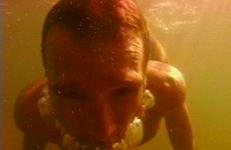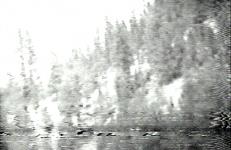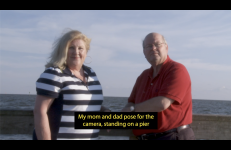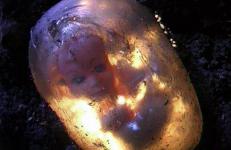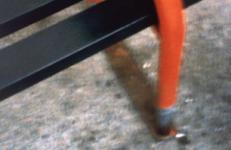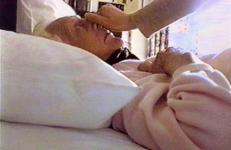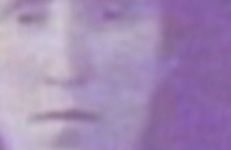Take a joyride through comfortable suburbia—a landscape molded by seductive television and corporate America (and keep in mind: disaster is another logo for your consumption...). This is the age of the "culture jammed" consumer preened with Friends hair, Survivor courage, and CNN awareness. A generation emptying their wallets for the most important corporate product of all: lifestyle. The psychological road trip across a slightly battered America travels at One Mile per Minute.
Family
The Only Ones Left (three-channel video installation*), featuring actor Jim Fletcher, weaves film noir and mafia genre references with CEO diatribes, while also exposing the conventions of the feature film climax. The three channels of video depict all plot points of the Hollywood film climax concurrently. The channels are arranged chronologically from left to right. This simultaneity draws attention to the familiarity of the subject matter and the inevitability of the violent consequences awaiting the characters.
This meditation on family and friends uses, as a point of departure, the relationship between the maker and his grandparents. The piece combines colorized Pixelvision and standard Pixelvision interviews, video beamed from the space shuttle Discovery, and English language records from the 1940s, to explore this often strained but humorous relationship. O’Reilly creates a child’s world, full of curiosity, in which all questions ultimately boil down to the question of identity.
Made at the San Francisco Art Institute with my students, this tuneful picture transports the viewer to the planet Mars as three attractive teens seek funding for an expedition into adulthood. Along the way they and we encounter the ups and downs of human relations and otherworldly intercourse. A family picture with timeless values, this foray into fantasy land on a tight budget should please the young at heart or old in body in unexpected ways. Although this trip is short on funding but big in concept it’s really quite a ride and looks like a million bucks for the vision impaired.
An experimental video about immigration. Looking at the potato (which was first cultivated in Peru) Papapapá paints a picture of a vegetable that has traveled and been transformed—following the migrating potato North where it becomes the potato chip, the couch potato, and the french fry. Papapapá simultaneously follows another Peruvian in motion, the artist’s father, Augusto Rivera. The stories of the two immigrants, the potato and Papa Rivera, converge as Augusto becomes a Peruvian couch potato, sitting on an American sofa, eating potato chips and watching Spanish language television.
Another in a series of sculptural films. Like it’s partner, 3 peonies, this is a short 16mm film made as a memorial for my grandmother who passed away in 2017. Her voice can be heard on the soundtrack singing a bit of song. What goes when the body goes? How many parents have we got stacked upon us into eternity like ladders to the afterlife?
- Stephanie Barber
Paternal Rites is a first-person essay film that examines the secret underbelly of a contemporary Jewish American family as they grapple with the aftereffects of physical and sexual abuse on their present-day lives. It is also a groundbreaking film about the nature of trauma and memory itself: the ways in which trauma encrypts in uncanny ways; the function of speech and narrative in the process of decryption; and the role of film and filmmaking in the practice of healing.
Peggy and Fred, sole inhabitants of post-apocalyptic Earth, weather a prairie twister and scavenge for sense and sustenance amid the ruined devices of a ghosted culture. The improvised and playful dialogue of the children provides a key to understanding the tape; their distracted sense of make-believe floats between realities, between acting their parts and doing what they want—patching together identities that, like fidgeting children, refuse to stand still.
A daughter leads her mother on a rope while they take a walk, looking for a place where the mother can bid her final farewell. Before she leaves, they have a picnic, she sings a song, and they chat about the family. An absurd domestic drama played out against the background of a summer’s day by the seaside.
a woman washes her hair in the kitchen sink while telling her friend about a memory of sitting in a bathtub and watching her aunt get ready to go out.
a narrative fragment,
a very short story,
a performance and exercise in the prosaic as mythologized through memory.
concision and the infinite that is always entwined with remembering and forgetting.
A vain, self centered mother competes with her daughter in the world of carnivorous men and sleazy movies.
The Grandmother recites the Mourners' Kaddish over her granddaughter.
Sixty-five years after the Allied invasion of Southern France, the director's mother, Cecily Barker Finley, tries to recall her involvement as a social worker aboard a WWII Red Cross ship. These memories are recorded in letters and phone calls with her daughter who is living on the coast of France where the invasion occurred. After her mother dies, she discovers a trunk, unopened since the 1940’s in the family garage that is filled with her mother's Red Cross memorabilia. By carefully documenting the trunk's contents, missing pieces of the invasion story begin to come into focus.
A drama, enacted on the cornfields of Iowa, of a woman haunted by the legacy of her mother and the acts that lead to mom's downfall on the banks of a river. Unable to follow a different path to drier terrain, the heroine over-lubricates both inside and out and gets stuck in the muck.
Scenes from the Micro-War explains, "The worst of times—riots, famine, war—could be just around the next corner and, in the battle to survive, this family is going to be battle-ready from here on in." This fractured narrative follows the misadventures of a family hypnotized by Reagan’s Space Wars, state terrorism, and Rambo/commando fashions, as the family has shifts from consumerist unit to military training force.
Scenes from the Micro-War explains, "The worst of times—riots, famine, war—could be just around the next corner and, in the battle to survive, this family is going to be battle-ready from here on in." This fractured narrative follows the misadventures of a family hypnotized by Reagan’s Space Wars, state terrorism, and Rambo/commando fashions, as the family has shifts from consumerist unit to military training force.
Sea In The Blood is a personal documentary about living with illness, tracing the relationship of the artist to thalassemia in his sister Nan, and AIDS in his partner Tim. At the core of the piece are two trips. The first is in 1962, when Richard went from Trinidad to England with Nan to see a famous hematologist interested in her unusual case. The second is in 1977 when Richard and Tim made the counterculture pilgrimage from Europe to Asia. The relationship with Tim blossomed, but Nan died before their return.
Originally part of a larger sculptural installation using prospector's tools, this tape reenacts the search for "Olga," a miner's wife who disappeared on her honeymoon in 1936. As Paul and Marlene Kos call out, "Olga... Olga...", the camera scans the Wyoming wilderness, and their search becomes ritualistic, the repetitive calls building in intensity and breaking down into chanted moans.
Shared Resources depicts the filmmaker’s family after their father was fired from his job as a debt collector and their parents declared bankruptcy, largely due to the filmmaker’s own debt. Following their parents’ day-to-day lives and father’s progressing disability, the film uses open captions and visual descriptions to provide access to Blind and Deaf audiences and to reflect how their family sees themselves in the film.
This is the story of two young girls who dig up a tiny woman from the back garden. They incubate her in their mouths, in their bed, they lock her in a dolls house wallpapered with pornography to make her grow up faster, feeding her through a tube in the door. When she is life-sized and ready to play they take her to the disco. A dark, comic, experimental fantasy on the implications of Little Girls Toys — with the existential melancholy of Frankenstein's monster.
"A compelling exploration of a child's inner life and logic. Impressive and distinctive."
A conversation about marriage and horses between two unseen men.
This title is also available on Donigan Cumming: Controlled Disturbance and Donigan Cumming: Four Short Pieces.
Shifting Positions is a semi-autobiographical/fictional trilogy exploring becoming queer later in life, my father's dementia, and our mid- and end-of-life crises. The selling of our family home of forty years prompted the making of the first section, entitled 'Last Home', which investigates the ways memories and spirits inhabit a house. In the remaining two sections— 'Napping' and 'Behavior Of Fascination'—the relationship between father and daugther is looked at through 'home movies' and documented intimate moments of private life. —Kathy High
In this piece Dani Leventhal recounts to camera her experiences of living and working in Israel, the fabled land of milk and honey of childhood lessons. With time spent in a metal factory and a battery farm for chickens, her harrowing tale includes stories of sexual harassment and sick birds. Against this background, there are idyllic images of bees and flowers, cows and calves, intimate caresses, dead birds. Every thing is worthy of Dani's gaze, and is transformed by the encounter, becoming more human or sacred, and we are closer to the pain and beauty of being alive.
Sites Unseen is a 16mm film of the Jewish cemetery in Warsaw, a photograph of a great Aunt who died in Treblinka, and my late grandmother eating her morning cornflakes.
Music by Zeena Parkins





